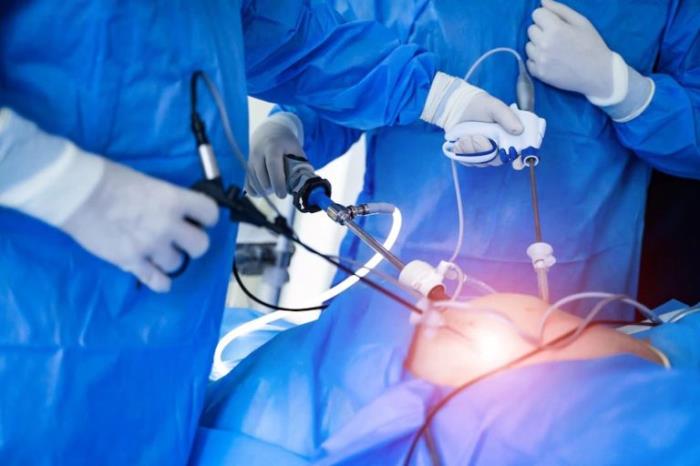The prevalence of obesity among adolescents has reached alarming levels in recent years, becoming a significant public health concern. Factors such as poor dietary habits, sedentary lifestyles, and environmental influences contribute to this rising trend. Obesity in adolescents is associated with numerous physical and psychological health issues, including Type 2 diabetes, hypertension, and low self-esteem. As these young individuals face increasingly complex health challenges, addressing obesity through effective interventions is crucial for improving their long-term health outcomes. This has led to a growing interest in bariatric surgery, particularly Mini Gastric Bypass, as a viable treatment option for adolescents struggling with severe obesity.
Understanding Mini Gastric Bypass Surgery
Mini Gastric Bypass (MGB) surgery is a bariatric procedure that aims to promote significant weight loss by reducing the size of the stomach and altering the digestive process. In this procedure, the surgeon creates a small stomach pouch and connects it directly to the small intestine, bypassing a portion of the digestive tract. This combination of restriction and malabsorption helps individuals consume less food while absorbing fewer calories and nutrients. Mini Gastric Bypass is generally less invasive than traditional gastric bypass surgery, often resulting in shorter recovery times and fewer complications, making it an appealing option for adolescents seeking to combat obesity.
Criteria for Considering Surgery in Adolescents
Determining eligibility for Mini Gastric Bypass in adolescents involves careful assessment by a multidisciplinary team, including pediatricians, nutritionists, and mental health professionals. Generally, candidates should be aged 12 to 18 years and have a body mass index (BMI) of 35 or higher, accompanied by obesity-related health conditions, or a BMI of 40 or higher without comorbidities. Additionally, adolescents must demonstrate a commitment to lifestyle changes and be psychologically prepared for the challenges of surgery and post-operative life. The decision to proceed with surgery is made collaboratively, ensuring that it aligns with the adolescent's health needs and personal circumstances.

The Unique Challenges of Adolescent Obesity
Adolescent obesity presents unique challenges that differentiate it from adult obesity. Adolescents are still undergoing physical, emotional, and social development, which can complicate their weight loss journey. Peer pressure, societal expectations, and body image issues often lead to feelings of isolation and low self-esteem. Furthermore, adolescents may struggle to adopt healthier lifestyle habits due to environmental influences, such as easy access to unhealthy foods and limited opportunities for physical activity. These factors can hinder their ability to lose weight through traditional methods, making surgical intervention a necessary consideration for some young individuals facing severe obesity.
Mini Gastric Bypass: A Potential Solution for Severe Obesity
Mini Gastric Bypass offers a potential solution for adolescents with severe obesity who have not achieved significant weight loss through conventional means. The procedure can lead to rapid and sustained weight loss, improving the physical health and overall well-being of young patients. Beyond weight loss, MGB has been shown to reduce or resolve obesity-related comorbidities such as Type 2 diabetes, hypertension, and sleep apnea. By addressing both weight and related health issues, Mini Gastric Bypass can significantly enhance an adolescent's quality of life and reduce the long-term risks associated with obesity.

Benefits of Mini Gastric Bypass for Adolescent Patients
The benefits of Mini Gastric Bypass for adolescent patients extend beyond significant weight loss. The procedure can lead to improvements in metabolic health, with many adolescents experiencing remission of conditions like Type 2 diabetes and hypertension shortly after surgery. Additionally, successful weight loss can boost self-esteem and enhance social interactions, as adolescents often feel more confident in their appearance and abilities. The long-term effects of MGB can include improved academic performance, better physical fitness, and overall emotional well-being. By providing a tool for sustainable weight management, Mini Gastric Bypass can pave the way for a healthier future for adolescents struggling with obesity.
Surgical Risks and Considerations for Teenagers
Adolescent patients undergoing mini gastric bypass surgery face specific risks, including complications related to anesthesia, infections, and nutritional deficiencies. The surgical team must assess these risks based on the teen's overall health, weight, and any pre-existing conditions, ensuring that the benefits of the procedure outweigh the potential risks.

Psychological Assessment: Evaluating Readiness for Surgery
Before surgery, a comprehensive psychological assessment is crucial to determine the adolescent's readiness for the procedure. This evaluation considers mental health, body image issues, and the ability to commit to lifestyle changes post-surgery. Engaging with a psychologist experienced in adolescent bariatric care can provide insights into the teen's emotional preparedness.
The Role of Family Support in Adolescent Bariatric Surgery
Family support plays a significant role in the success of adolescent bariatric surgery. Involvement from family members during pre-surgery consultations and post-operative care helps create a supportive environment, encouraging healthy habits and emotional stability throughout the weight loss journey.
Long-Term Effects of Mini Gastric Bypass in Adolescents
Research indicates that mini gastric bypass can lead to significant long-term benefits for adolescents, including substantial weight loss, improved metabolic health, and enhanced quality of life. However, it is crucial to monitor growth and development throughout adolescence to ensure that nutritional needs are met.
Nutritional Considerations Post-Surgery for Teens
Post-surgery, adolescents require a tailored nutritional plan to ensure they receive essential nutrients while adjusting to their new eating patterns. Dietitians specializing in bariatric care can help develop meal plans that support weight loss while meeting the unique nutritional needs of growing teenagers.
Addressing Concerns About Growth and Development
Parents and healthcare providers must closely monitor the growth and development of adolescents after surgery. While weight loss can improve overall health, it is essential to ensure that the surgery does not negatively impact the teen’s physical growth or development. Regular follow-ups with pediatricians and nutritionists can address these concerns.
Success Stories: Adolescents Who Have Benefited from Surgery
Sharing success stories of adolescents who have undergone mini gastric bypass can inspire hope and provide motivation for those considering the procedure. These testimonials often highlight improved health, increased self-esteem, and better social interactions post-surgery.
Alternative Treatment Options for Adolescent Obesity
In addition to surgery, several alternative treatment options for adolescent obesity exist, including lifestyle modifications, behavioral therapy, and medically supervised weight loss programs. Exploring these options can help determine the best course of action for each individual teen.
The Importance of Comprehensive Pre-Surgical Evaluation
A comprehensive pre-surgical evaluation is vital for ensuring that adolescents are suitable candidates for mini gastric bypass. This evaluation typically includes physical health assessments, psychological evaluations, and nutritional consultations to identify any potential concerns before proceeding with surgery.
Post-Operative Care: Monitoring Health and Progress
After surgery, ongoing post-operative care is essential for monitoring health, weight loss progress, and any complications that may arise. Regular follow-ups with healthcare professionals can help manage nutritional needs, assess mental health, and support lifestyle changes.
Psychological Impact of Weight Loss Surgery on Adolescents
Weight loss surgery can significantly affect an adolescent's mental health. While many experience improvements in self-esteem and body image, some may struggle with emotional challenges as they navigate their new identity. Providing access to counseling or support groups can help adolescents cope with these changes.
Understanding the Role of Behavioral Therapy
Behavioral therapy is a crucial component of the post-surgery process, helping adolescents develop healthy habits and coping strategies. This therapy can address emotional eating, body image issues, and the psychological aspects of lifestyle changes after surgery.
Insurance and Financial Considerations for Adolescent Surgery
Navigating insurance and financial considerations for adolescent bariatric surgery can be challenging. Families should explore insurance coverage options, financing plans, and potential support programs to help manage the costs associated with the surgery and post-operative care.
Conclusion: Weighing the Options for Adolescent Mini Gastric Bypass
When considering mini gastric bypass for adolescents, it is essential to weigh the potential benefits against the risks and challenges. A thorough evaluation of the adolescent's health, psychological readiness, and family support system can guide the decision-making process, ensuring the best possible outcomes.
Impact of Mini Gastric Bypass on Comorbid Conditions
Discover how Mini Gastric Bypass can affect comorbid conditions commonly associated with obesity. This section highlights the improvements in health issues such as hypertension, sleep apnea, and joint pain, emphasizing the overall benefits of surgical intervention for long-term health.
Innovations in Mini Gastric Bypass Surgery Techniques
Stay informed about the latest innovations in Mini Gastric Bypass surgery techniques. This section covers advancements in minimally invasive approaches, enhanced surgical tools, and improved patient outcomes, showcasing how these developments are shaping the future of weight loss surgery.
Best Mini Gastric Bypass Surgery in India
The Best Mini Gastric Bypass Surgery in India offers a less invasive weight loss procedure, helping patients achieve significant and sustained weight loss by reducing stomach size and rerouting digestion.
Best Mini Gastric Bypass Hospitals in India
The Best Mini Gastric Bypass Hospitals in India are equipped with modern technology and skilled bariatric teams, ensuring comprehensive care from pre-operative assessment to post-operative follow-up.
Mini Gastric Bypass Surgery Cost in India
The Mini Gastric Bypass Surgery Cost in India is affordable, offering transparent pricing and flexible options without compromising on the quality of care at leading hospitals.
Best Mini Gastric Bypass Surgeons in India
The Best Mini Gastric Bypass Surgeons in India are highly experienced in performing this procedure, providing personalized treatment plans to help patients achieve the best possible outcomes.
FAQ
Is mini gastric bypass surgery safe for adolescents?
While mini gastric bypass can be safe for adolescents, it requires careful evaluation by a specialized medical team to assess risks and benefits based on individual health and maturity.
What criteria must adolescents meet to qualify for mini gastric bypass?
Adolescents typically need to have a body mass index (BMI) over a certain threshold, have failed other weight loss methods, and demonstrate readiness for lifestyle changes. A psychological assessment is also necessary.
What are the potential benefits of surgery for overweight teens?
Potential benefits include significant weight loss, improvements in metabolic health (like type 2 diabetes and high cholesterol), enhanced quality of life, and better psychological well-being.
How does mini gastric bypass affect growth and development in adolescents?
With proper nutritional support and monitoring, most adolescents can experience normal growth and development post-surgery. However, ongoing assessments are crucial to ensure their needs are met.
What kind of post-operative care is necessary for teenage patients?
Post-operative care includes regular follow-up appointments with healthcare providers, nutritional counseling, psychological support, and monitoring for any complications or health issues that may arise.